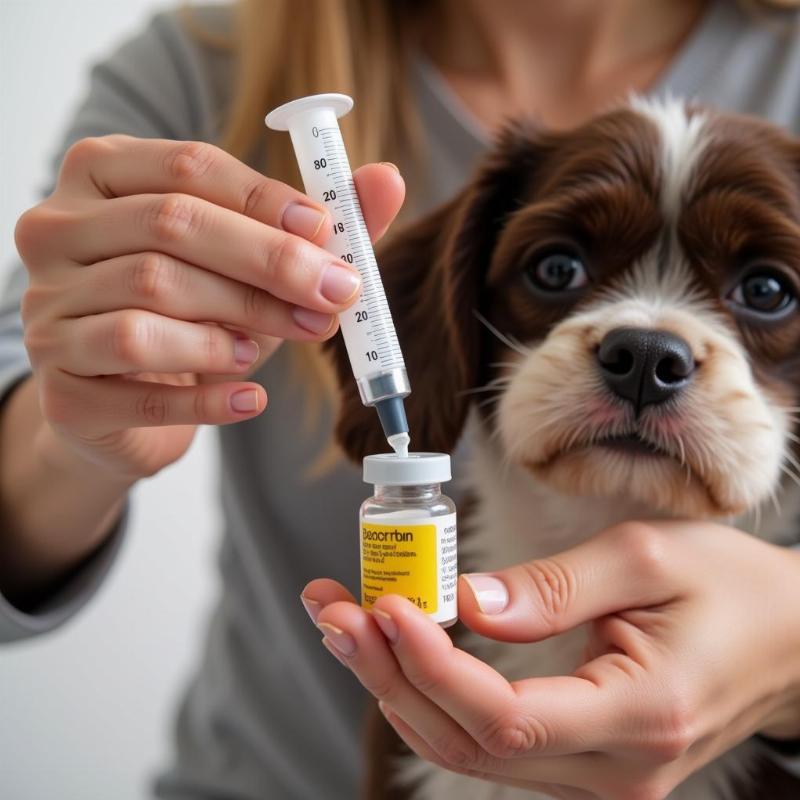Bactrim is a commonly prescribed antibiotic for dogs, used to treat various bacterial infections. Understanding the correct bactrim dose for dogs by weight is crucial for effective treatment and to avoid potential side effects. This guide provides essential information for pet owners in the US about administering Bactrim safely and effectively.
Understanding Bactrim for Dogs
Bactrim, also known as sulfamethoxazole-trimethoprim, is a combination antibiotic effective against a wide range of bacterial infections in dogs. These can include urinary tract infections (UTIs), skin infections, respiratory infections, and certain types of ear infections. However, it’s essential to remember that Bactrim is not effective against viral or fungal infections. A veterinarian must diagnose the infection and prescribe the appropriate dosage based on your dog’s individual needs.
Calculating the Correct Bactrim Dosage for Your Dog
The typical bactrim dose for dogs is 15-30 mg/kg of body weight, divided into two doses per day, usually every 12 hours. This means a 10-pound dog would receive a significantly lower dose than a 60-pound dog. It’s vital to use a precise measuring tool, such as an oral syringe calibrated for milliliters, to administer the correct amount of liquid Bactrim. Never estimate the dose or use household spoons, as this could lead to inaccurate dosing.
 Measuring liquid Bactrim for dog
Measuring liquid Bactrim for dog
Potential Side Effects and Precautions
While generally safe, Bactrim can cause side effects in some dogs. These can include vomiting, diarrhea, loss of appetite, and lethargy. More serious side effects, though rare, can include allergic reactions, liver damage, and blood disorders. Immediately contact your veterinarian if your dog exhibits any unusual symptoms while taking Bactrim. It’s crucial to inform your vet about any other medications your dog is currently taking, as drug interactions can occur. Also, inform your vet if your dog has any pre-existing health conditions, especially kidney or liver problems.
When to Consult Your Veterinarian
It is vital to consult with your veterinarian before administering any medication to your dog, including Bactrim. Only a veterinarian can accurately diagnose the infection and prescribe the correct dosage and duration of treatment. Never self-treat your dog with leftover Bactrim or medication prescribed for another pet, as this can be dangerous and ineffective. If you suspect your dog has an infection, seek professional veterinary care promptly.
Conclusion
Administering the correct bactrim dose for dogs by weight is essential for successful treatment and minimizing potential side effects. Remember to always consult with your veterinarian for accurate diagnosis and treatment recommendations. Careful monitoring of your dog for any adverse reactions is also crucial. By working closely with your veterinarian and following their instructions, you can ensure your furry friend receives the best possible care.
FAQ
- Can I give my dog human Bactrim? No, never give your dog medication intended for humans. Human formulations of Bactrim can contain different ingredients and dosages that may be harmful to dogs.
- What should I do if my dog misses a dose of Bactrim? Give the missed dose as soon as you remember. However, if it’s almost time for the next dose, skip the missed dose and continue with the regular schedule.
- How long does it take for Bactrim to start working in dogs? You may start to see improvement within a few days, but it’s essential to complete the entire course of antibiotics prescribed by your veterinarian, even if your dog seems better.
- Can Bactrim be given with food? Yes, Bactrim can be given with or without food. If your dog experiences stomach upset, giving it with food can help.
- What if my dog’s symptoms don’t improve with Bactrim? Contact your veterinarian if your dog’s symptoms don’t improve or worsen after a few days of treatment. They may need to adjust the dosage or prescribe a different antibiotic.
- Are there any natural alternatives to Bactrim for dogs? While some natural remedies may support immune health, they should not replace prescribed antibiotics. Discuss any alternative treatments with your veterinarian before using them.
- Where can I learn more about dog health and medications? You can find reliable information about dog health and medications on reputable veterinary websites and by consulting with your veterinarian.
Related Articles
- smz-tmp 480 mg for dogs dosage
- how much bactrim for a 60 pound dog
- bactrim 800 160 dosage for dogs
- bactrim for dogs dosage chart calculator
Beautdogs.us is your premier source for comprehensive and reliable information on dog care, breeds, and lifestyle. We offer expert advice on nutrition, training, health, and grooming, empowering both new and experienced dog owners to provide the best possible care for their beloved companions. Explore our website for valuable insights into the world of dog ownership, from breed-specific guides to product reviews and expert tips. Contact us at [email protected] or +1 501-555-7529 for personalized advice. Beautdogs.us is dedicated to helping you and your dog live a happy, healthy life together.